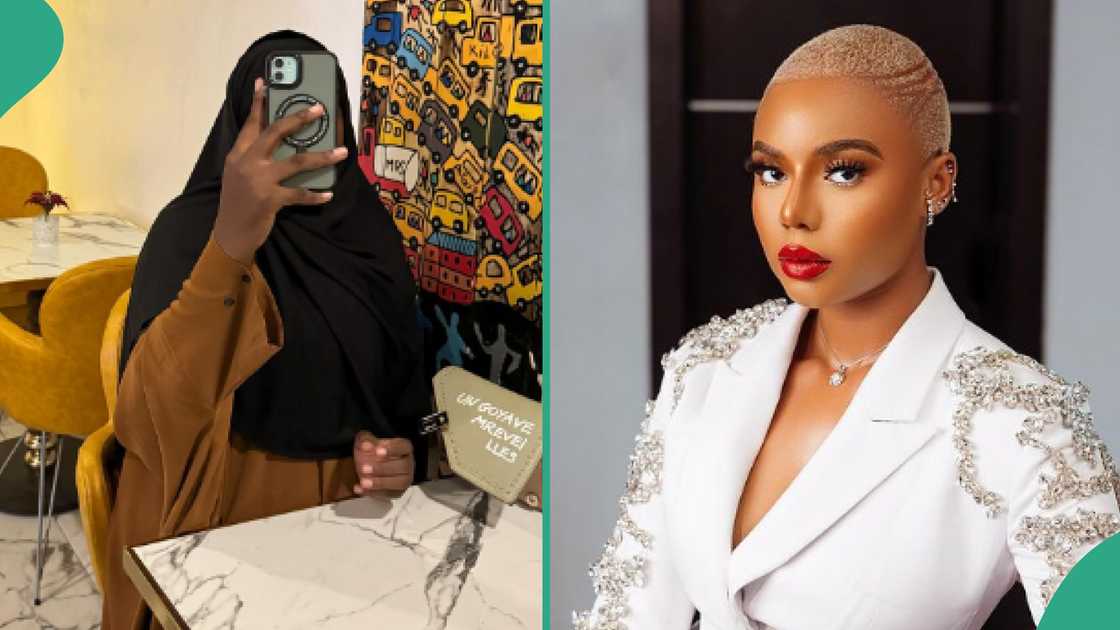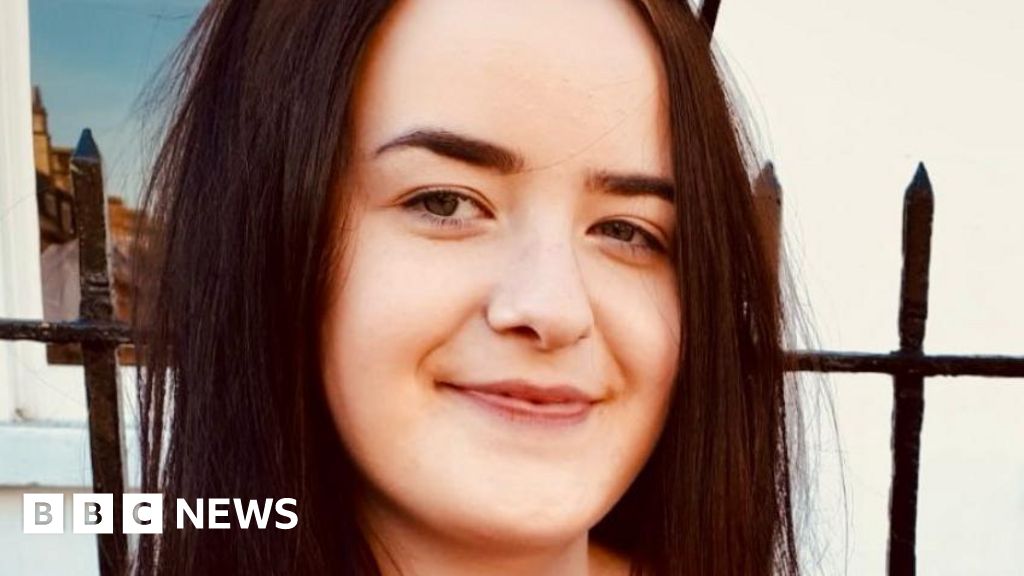- Nigerian actress Nancy Isime caused a stir after sharing photos from an upcoming movie she featured in
- The movie star and others wore niqabs while carrying weapons in what appeared to be a robbery scene in a movie
- Legit.ng had a chat with Nigerian author, content creator and Muslim convert, Sumayyah, and she shared her niqab-wearing experience and more
Just recently, Nollywood actress Nancy Isime sparked an online debate about the portrayal of Muslims in the media after she shared photos from a movie she featured in.
In the photos, the movie star and others wore niqabs in what appeared to be a robbery scene seeing as they carried dangerous weapons and posed in front of a bank.

Source: Instagram
Nancy’s post sparked a public outcry from Muslims, especially niqab-wearing women, as they kicked against the negative portrayal in the movie.
This development led to Legit.ng having a chat with Nigerian author, content creator and Muslim convert, Sumayyah.
PAY ATTENTION: Сheck out news that is picked exactly for YOU ➡️ find the “Recommended for you” block on the home page and enjoy!
Sumayyah, who is also a niqab-wearing woman, explained how Muslim women in Nigeria have had to put up with a lot of unjust treatment.
The author, who wasn’t always a Muslim, went on to share her first negative experience after she started wearing the hijab.
Sumayyah shared the story of how it happened in a pharmacy inside a mall and how the attendant quickly locked the drawer and looked at her in fear after she walked in with a backpack.
In her words:
“Muslims in general and Muslim women especially have to put up with uncivil treatment in most parts of Nigeria. I was not always a Muslim, and I did not always wear the hijab, so believe me when I say the world does treat us differently. The first negative encounter I had with my hijab was at a pharmacy in a mall. I walked in with a backpack, and the pharmacist instantly locked the drawer and was looking at me, visibly afraid, like I had a bomb in my bag. This was strange to me. That was in 2019, and subsequently, there have been worse cases than that one.”I once believed Muslims were bad
Sumayyah said that while many people treat Muslims differently, she would not blame them too much because it was caused by what has been portrayed about them in the media. She said:
“People treat us differently. I don't blame them because every day, there's someone saying something negative about Muslims on social media whether true or concocted to promote their religious bigotry. Before I found Islam, I used to believe being a devout Muslim was bad too. My four-year-old sister once called a Northern beggar the name of a terrorist group because that was what she saw on TV about people who looked like him every single time.”Why Muslim women opposed Nancy Isime’s photos
The author went on to speak about why Nancy Isime’s viral post caused a stir among Muslim women on social media. According to her, Nigerians are already people with fragile emotions, and it’s even worse for women who are already treated like low-class citizens while practising their faiths.
She said:
“The feelings of the average Nigerian are fragile as our emotions take a beating from all angles all the time. Imagine how a group of women who are treated as low-class citizens in most parts of Nigeria must feel. In a situation like this, Nancy's portrayal of the Muslim woman is naturally viewed as an attack. People already have it ingrained in their subconscious that we are uneducated, backwards, terrorists or terrorists-in-training, uncivilised, and we've been qualified with so many other unsavoury adjectives. Her movie feeds into a horrible erroneous narrative, and she might as well have written a press release stating that she believes myself and all my Muslim sisters are truly security threats.”Why Muslim women wear hijab
Sumayyah also explained why Muslim women wear hijab. She noted that it was in accordance with the faith of Islam as an act of worship to God, and it is more than just a piece of clothing.
She went on to note that even though wearing the head covering greatly reduces their chances of getting employed in some parts of Nigeria, she has friends who are skilled professionals in various fields.
“I know that wearing the hijab in Nigeria, especially South West Nigeria (in my experience), reduces your chances of employability and wearing the niqab almost erases it totally and yet we wear it. We wear it because of our understanding that it is an act of worship in obedience to God. It is not just a piece of clothing. Among my friends who share this belief are architects, doctors, lawyers, software developers, HR professionals, authors, digital designers, etc. The fact that we live conservative lives allows the world to carry on whatever conversations they like about us, and it's okay if people choose to be uninformed and ignorant. However, for an artist to use the niqab in a movie without researching it properly is irresponsible at best, and if she did research it and still decided to do that, then that's a deliberately offensive act.”The young author also reacted to online comments about how some Muslim women wear hijabs and niqabs to carry out negative activities. She explained that wearing it is because it was commanded in the Qur’an and even if a person carries out inappropriate acts with it, that does not mean it should be associated with such.
“We wear the hijab because of a command in the second chapter of the Qur'an. The niqab and the hijab are both divinely revealed as prescribed outfits for Muslim women when they are among strangers, especially those of the opposite gender. It is not just something we picked up out of boredom or a desire to look strange. Just like every other group of people, there are bad eggs. Some women may wear it and engage in inappropriate activities. That does not mean that the hijab or niqab should be associated with such activities. That's stereotyping and a huge disservice to exceptional women who do amazing things while wearing them”, she said.On a final note, the content creator expressed her opinion about filmmakers who make movies that encourage harmful stereotypes. She described this as an irresponsible act, among other things.
In her words:
“I genuinely believe that a responsible producer, scriptwriter, or actress would create a movie to correct negative stereotypes instead of feeding into the ignorance of the bandwagon. A few years back, we had to fight for the right not to take off our hijab when we are being called to bar as lawyers. Many people who have never had a conversation with a hijabi or even understand that we truly never take these things off outside the house had hot takes and ill informed articles to share. We typically mind our business and leave everyone alone. The least the rest of you can do is leave us alone in return.”Cleric backtracks after threatening Femi Adebayo
Meanwhile, Legit.ng earlier reported that Nigerian Muslim cleric, Sheikh Hamad Labeeb, was back in the news after calling out Femi Adebayo.
Shortly after Sheikh Labeeb faced backlash for threatening Femi Adebayo, another video made the rounds of the Muslim cleric making amends.
In a video posted by @Queenmother0 on TikTok, Sheikh Labeeb was heard explaining the plot of the movie to his congregation. He explained the role Femi Adebayo played in the movie and how the wearing of niqab came into play.
Proofreading by James, Ojo Adakole, journalist and copy editor at Legit.ng.
Source: Legit.ng
















 English (US) ·
English (US) ·